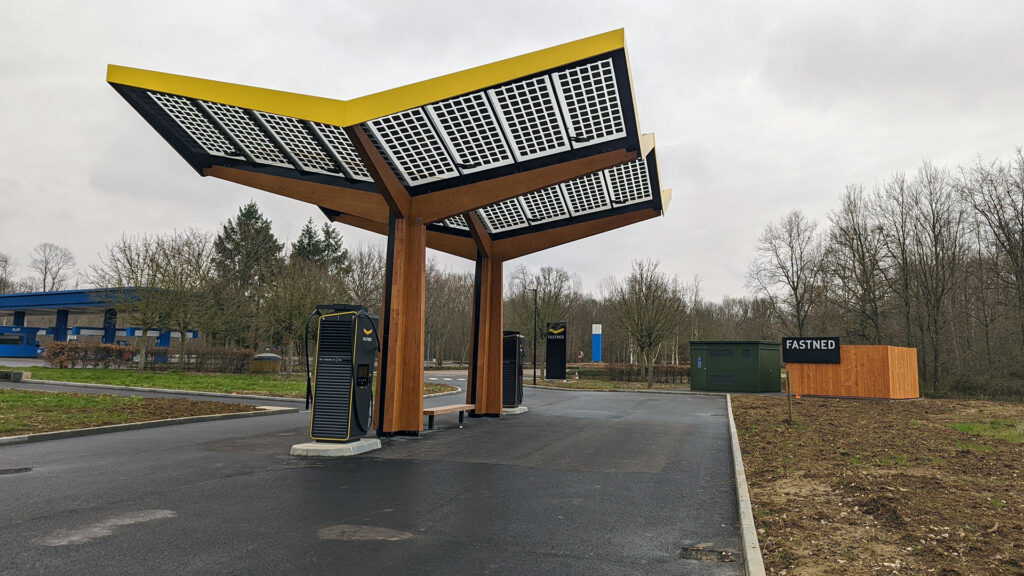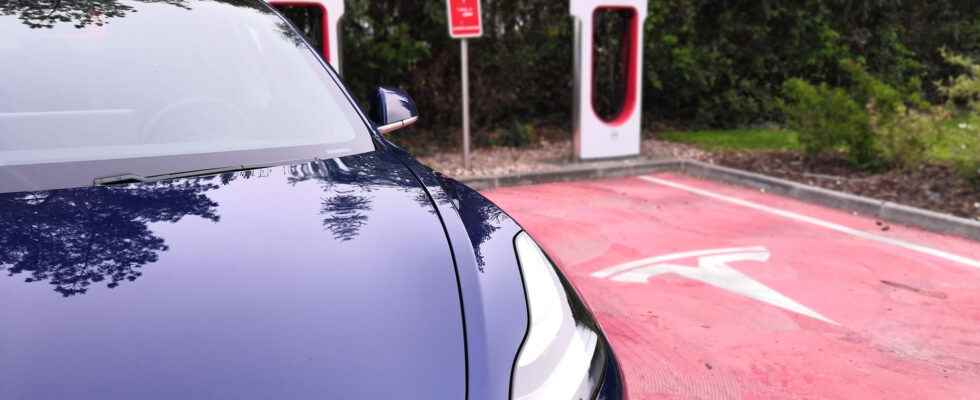Up or down, Tesla supercharger prices have been changing so fast lately that it’s becoming impossible to keep up with the pace of change. Desired strategy or improvisation over the water, we can begin to ask ourselves questions.
Tesla Supercharger users can rejoice because since November 23, the price of refills has just started to fall again after several increases. For how long though? It is impossible to make any projection, since hardly a tariff seems to be recorded that it is already likely to change. You could almost believe that this is a Black Friday offer that could disappear in a few days.
Usually, when the manufacturer makes an offer for a specific duration on its superchargers, an official communication specifies it. This is not the case here, so we can imagine that these new rates are not only punctual. But it is better not to rejoice too quickly with Tesla, the brand has accustomed us to rapid and brutal changes.
A cruel lack of long-term legibility of the top-up offer
If we can understand that the prices of fast charging evolve in part according to the price of electricity, Tesla still seems to be looking for the right formula in Europe. Tesla has thus made several modifications over a fairly short period of time, which is not really to please either Tesla owners or users of other brands wishing to use superchargers.
In September 2022, a first fairly significant price increase marked the start of the school year. Tariffs had gone from an average of €0.52 to €0.69 per kWh. The prices of superchargers have actually grown steadily over the past 3 years. This increase of more than 30% was then one of the largest recorded.
A month later, Tesla introduced rates with peak and off-peak hours. During peak hours, the rates included a new rate increase. This offer is supposed to encourage charging when the local network is not too busy, and therefore to avoid the period between 4 p.m. and 8 p.m.
Then, Tesla has once again changed these prices on November 23. The manufacturer is keeping the system of peak hours and off-peak hours, but is reducing charging prices for everyone by 40% overall:
- Tesla owners can therefore charge between 0.32 and 0.36 €/kWh depending on the charging time,
- “Non-Tesla” customers who do not have a €12.99/month subscription are charged between €0.48 and €0.54/kWh depending on the time slot.
We take this opportunity to remind you that the prices of Tesla superchargers vary by several cents depending on the station. These are average rates observed, which once again does not really help with the readability of the offer.
The brand is therefore returning to prices similar to what it offered at the end of 2020 and the beginning of 2021, which is good news for those who drive a Tesla.
And the other charging operators, how do they manage their prices?
The main operators fell into two categories: those offering a tariff per kilowatt hour and those offering a tariff per minute, which gave wide disparities in the cost of charging for the end user. Per-minute pricing is tending to disappear, retaining only offers per kWh, fairer for all electric cars.
ionity
If Ionity changed its formula for the tariff of its recharges in May 2022, moving from a tariff per minute to a tariff per kilowatt hour, the operator’s prices did not fluctuate with the price increases of the energy.
Ionity tariff in France (excluding partner manufacturer offers):
- 50 kW terminal: €0.39 per kWh
- 350 kW terminal: €0.69 per kWh
Fastned
For its part, Fastned, which is beginning to develop its network of terminals, particularly on the motorways, has also kept the same price since its introduction in France:
Fastned France tariff in 2022
- France: €0.59 per kWh
During the presentation of the Watts d’Or trophies, we asked the question of the evolution of the prices to the Fastned France representative who came to collect his prize. Their answer was simple, for France, the electricity tariff was negotiated over a fairly long period, and the operator does not plan to increase its tariffs. This is good news for those wondering if Fastned would follow Tesla’s lead.

Total Energy
Since July 1, 2022, Total has been changing its rates from a per-minute formula to a kWh offer. Fares vary depending on whether the station is on the expressway or in town. On the other hand, the tariff offer was not increased to follow the trend in the price of energy.
Total rate on fast track per kWh:
- 50 kW terminal: €0.55 per kWh
- Terminal above 50 kW: €0.65 per kWh
Electra
Among the networks that are climbing in France, we can also observe that Electra still offers an attractive price of €0.44/kWh, without having planned to increase its prices.
Other operators have also negotiated energy tariffs over long periods and not on market tariffs, which allows them to avoid significant fluctuations, at least as far as France is concerned. Because in the rest of the European countries, it is another subject.
The Allego exception
Finally, only the Allego network had to announce two successive increases, in September then October, of its prices in France:
- Regular charge (AC 22kW): 0.60 EUR/ kWh instead of 0.40 EUR/ kWh
- Fast charge (50kW): 0.88 EUR/kWh instead of 0.55 EUR/kWh
- Ultra-fast charging (>50kW): 0.98 EUR/kWh instead of 0.65 EUR/kWh
This makes it the least attractive network for fast charging. And, he’s the only one who seems to improvise his pricing strategy like Tesla.
Even if the majority of charging is done at users’ homes, the lack of long-term visibility on the prices of fast charging, suitable for long journeys, does not really help the transition to electric vehicles. Motorway journeys can become a real brake on the transition to electric vehicles with very high consumption and refills that are more expensive than an equivalent journey with a thermal vehicle.
Fortunately, some operators do not adapt charging rates to the electricity market; this allows for a slightly less chaotic transition. We strongly hope that Tesla will start to slow down the pace of changes to its charging pricing policy, to less sow doubt in the minds of consumers.
